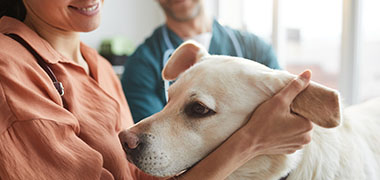
This role has a moderate level of AI exposure. AI can enhance efficiency for some tasks, but this job still relies on human skills and decision-making.
Explore all careersA Veterinarian diagnoses and treats animals, specialising in areas like pets or wildlife, while ensuring excellent animal care and communication.
Get qualified to work as a Veterinarian with a course recognised across Australia. Speak to a training provider to learn more.
Browse occupations related to Veterinarian
In Australia, a full time Veterinarian generally earns $1,950 per week ($101,400 annual salary) before tax. This is a median figure for full-time employees and should be considered a guide only. As you gain more experience you can expect a potentially higher salary than people who are new to the industry.
 Courses.com.au Team
Courses.com.au Team
The number of people working in this industry is likely to grow strongly in coming years. There are currently 8,100 people employed as a Veterinarian in Australia. Veterinarians may find work across all regions of Australia.
Source: Australian Government Labour Market Insights
 Courses.com.au Team
Courses.com.au Team
A Bachelor of Veterinary Science (Honours) is an ideal qualification if you’re planning a career as a Veterinarian. This course will prepare you for a range of roles in veterinary medicine and includes clinical placements as part of your studies. You’ll learn to diagnose and treat a range of domestic animals, pets and native species.
 Courses.com.au Team
Courses.com.au Team



A Veterinarian treats animals for illnesses, injuries and other health concerns. You might specialise in a particular type of animal such as domestic pets or work with wildlife or exotic animals. Veterinarians examine animals and make diagnoses. You might conduct regular health checks, provide medication, perform surgeries or perform other treatments.
Veterinarians should be passionate about animals and have excellent animal handling skills. It’s important you can communicate well with owners and colleagues and work as part of a larger team. Veterinarians must have excellent attention to detail and be able to follow correct procedures. You’ll need to be able to remain calm during challenging situations.